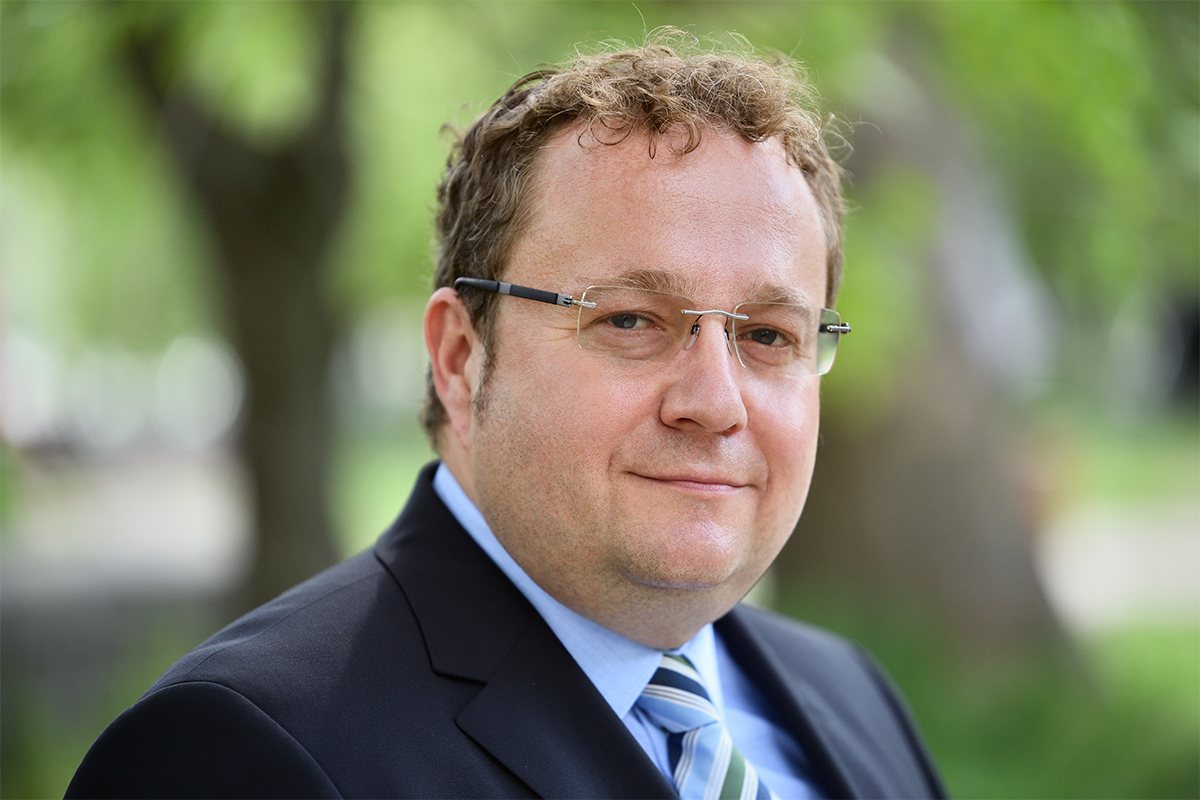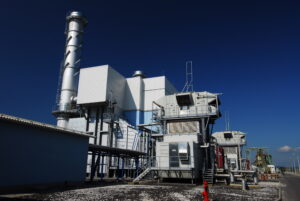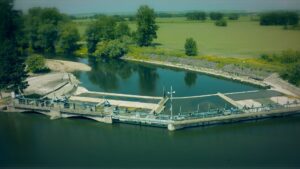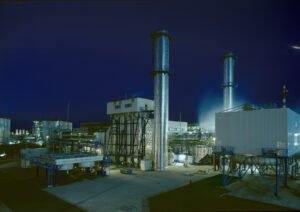
15 Jan Sustainability and innovation power success in energy
Attila Chikán Jr., CEO, Alteo, details the energy company’s focus on security of supply, climate protection and competitiveness through cost efficiency and state-of-the-art solutions
Alteo is a leading participant in Hungary’s energy market, offering innovative and sustainability-focused solutions. The group owns a total of 26 power and heating plants with a capacity of 192 MW of electricity production and 880 MW of heat generation. To start this interview, can you give us a quick overview of the company, its activities in Hungary and how it stands out in the country’s energy market?
Alteo is a fairly new player in the energy sector, as we are just 12 years old. The company was founded based on the call from the market and potential clients for more sustainability in the energy sector. Therefore, we have a very special approach of sustainability in energy—we have actually translated the sustainability terms in our energy experience.
Our strategy is based on three key pillars. The first one is, of course, security of supply, which is very important in energy. We are supplying industrial clients, among which are some of the biggest Hungarian energy consumers, and so when operating a power plant, the security of supply is very important. It has always been and it will always be. In addition to that, competitiveness is also very prevalent: that means cost efficiency and state-of-the-art-solutions for energy supply. The third pillar of our strategy is climate protection. Whatever we do, our solutions should be produced in respect of these three criteria. If we miss any of these criteria, we wouldn’t be fulfilling the interest of the client.
Alteo has a wide and growing portfolio of power plants, including renewable energy and natural-gas-fired power plants. In renewables, the most important parts of our portfolio are the so-called weather-dependent renewables—mainly solar, wind and some hydro. The other parts of our portfolio are natural gas fired. Natural-gas-fired power plants have a very important role to play in Hungary, because their production is very flexible. When you operate a portfolio of renewable power plants, production is very hard to predict, because you are dependent on the weather, which you can’t obviously influence. Therefore, you need to have some flexible capacities in order to ensure the balance between demand and supply of electricity. For that we are using natural-gas-fired power plants.
One of the most important parts of our activity is to invest in power plants. We invest in power plants because they have a good return and we believe that, from the current climate protection point of view, it’s very important to have more and more renewable energy in Hungary. Yet to strengthen the security of supply within this whole system, we are also constantly investing in natural-gas-fired power plants, because we are using them as a flexible capacity in order to balance the renewable part of our portfolio. Actually, we are organizing these smaller power plants into one combined so-called “virtual power plant,” so that we are able to operate this whole system as one. This is a continuous optimization and it means that we can offer this service, not only for ourselves, but to the national level.
We are one of the leading providers of balancing energy and balancing services at the national level, which is very important from a sustainability point of view: the more balancing we are able to do, the more capacity we are implementing, the more we can supply renewable energy to Hungary, if you want to maintain the security of supply. Each renewable investment is—of course—a for-profit investment, and each power plant should have its own balance sheet and profit and loss, and the numbers should be green of course, but there is a huge synergy among all of those assets and this enables us to give this balancing service. This is a very relevant source of our income and our profits, and this is the soul of our whole concept.

As part of its United Nations Sustainable Development Goals (UN SDGs), Hungary aims to reduce its greenhouse gas emissions by 40 percent by 2030. A further commitment to becoming climate neutral by 2050 was enshrined in law last June. One of the government’s plans is to boost solar capacity by 12 GW by 2040. How is a company like Alteo participating in these ambitious sustainability targets and expanding its renewable energy sources?
Our growth or future growth has three main sources. The first one is the solar boost that we are engaged in at the moment. The first part of the boost is predicted to be in the next five years to reach 6,000 MW by 2030 and 12,000 MW by 2040. If you want 6,000 MW of capacity by 2030, you have to make the investment decision by 2026, because of the financing and time lead of such a project. We are about to invest in solar energy for the future, in the short and in the long run.
The second is our balancing market services. We are forecasting that the need for these services will continuously grow, which is logical since solar will increase. We are about to heavily develop our balancing power competence—not only in quantitative terms but also in qualitative terms. We have an artificial-intelligence-based project that is very innovative and is one of the most advanced in Central Eastern Europe. We are working on real-time production management. In the commodity market, robots are now trading instead of humans, which significantly enhances the speed of transactions and makes trading happen in real time. We want to implement a similar system in our power plants. A couple of years ago, an ordinary power plant would need 15 minutes to make operational changes: from getting the data, making the decision and then making operational changes in the system. Now we need only a few seconds for that, so it’s almost in real time. We actually spent a lot innovation capacity and also equity in order to improve these aspects.
The third source of growth will be the sustainability aspect. In the last couple of years, sustainability has become a major issue for the Hungarian government, hence this strong push for solar energy production. The sustainability concern is gaining speed all over the world and through all political leaders nowadays. The same has happened in Hungary already and we now have this ambitious strategy. I believe that Alteo’s business model, which is very much based on sustainability and innovation, will offer us numerous opportunities, especially in the industry sector. We certainly will have a lot to do in the next 10 years.

Alteo has invested in a virtual power plant system in a move to increase efficiency and smooth the monitoring and operation of its business. What other innovations has the group introduced that you are most proud of, and what new concepts or technologies are you currently developing or looking to acquire?
In today’s energy markets, democracy has started to operate, meaning that even a single household can have its own energy strategy, not to mention the bigger industrial customers or municipalities. One or two decades ago, the energy industry was a “take it or leave it” type of decision: if someone wanted to buy electrical energy, they had to see if it was available or not, and pay the price for it. Now, we are working on tailor-made solutions, where each and every customer can have its own strategy, based on those three factors that I mentioned earlier: security of supply, climate awareness and cost efficiency or competitiveness.
Each of our customers has a different strategy as to how to prioritize between these three factors. For a chemical firm, for instance, security is the most important thing because a chemical firm should be 100-percent security based and can’t tolerate any dangerous activity caused by lack of power. A car dealership is totally different: if there is a one-hour shortage of electricity, nothing really happens, so that they can prioritize climate awareness or cost efficiency. These three factors form a triangle, and each and every company has its ideal point on the triangle for decision making. We are helping them to reach it.
This is actually a great innovation because, instead of producing electricity or heat and supplying the market, we are actually fulfilling an energy strategy for our clients. I think it’s a very important change. You can call this digitalization or artificial intelligence or technology evolution—whatever the label you choose, behind these labels what matters is that our clients can democratize the energy markets.
Other important innovations are taking place in other territories that are very close to the energy sector but not part of the classical so-called energy business. I’m talking about circular-economy aspects, for example, waste management or e-mobility. We are trying to find synergies among these other areas in order to be successful in these markets as well. One of the sources of our growth also comes from our new businesses, such as waste management or e-mobility markets. They are on one hand standalone businesses, but they are also important within the group. The main reason for the existence of Alteo is to try to find synergies between the new and the old assets. If we can leverage these synergies, we will be very competitive.
In 2019, Alteo also inaugurated a 6MW battery storage plant. It was the first storage system of its kind in Central and Eastern Europe. We have successfully integrated it into the balancing market and no one in the region had done this before us. It was a great success, and the President of Hungary and the Minister of Innovation and Technology were our guests at the opening ceremony. It’s now been operating successfully for two years.
What other big investments is Alteo is planning to make as part of its 2020-2024 strategy?
Natural-gas-fired investments remain important, as they serve the balancing market services we provide; renewables also remain a big investment focus, mainly solar. Wind could also have been important, but Hungary’s energy strategy does not give preference to wind developments for the time being. Other renewables like hydro, biogas or biomass have much less importance and less potential in Hungary for us. So, natural gas and solar are our key focus areas.
We want to serve the largest industrial customers. If they have new investments, developments or they want to outsource their energy management and supply, if they want to be a bit more effective in fulfilling their energy strategy, then they can turn to us.
We had experienced a kind of dual growth in the last couple of years, with organic growth on the one hand through signing new contracts, but we have made acquisitions too. New capacity can be built or can be bought. We are also planning to make acquisitions in the next couple of years—the major difference is that you can really plan your organic growth but you cannot really plan acquisitions, because this is a more opportunistic sort of business.
Going forward, how would you summarize Alteo’s growth and development strategy for the coming years? Do you have any further ambitions in the region beyond Hungary’s borders or are you looking for new partnership and cooperation opportunities?
Alteo has recorded a very aggressive growth rate, at a double-digit level, for the past 10 years. Whatever happened in the domestic or world economy, we could perform at a double-digit growth rate. Sooner or later, we will come the point where the Hungarian market will become a bit narrow for us, but we can’t say if that will be in the medium or long term. We have so many opportunities now in Hungary that the opportunity cost of going abroad is not in balance with the additional opportunity aspects or even the additional diversification. That means that in the near future most of our growth and our investments will remain focused inside Hungary.
We have many opportunities, plus we have a very strong relationship with all the relevant stakeholders and are actually in the middle of very exciting projects in Hungary. We will go abroad, I’m sure, but this will be a very cautious move in an opportunistic manner. If we find a good opportunity outside Hungary, then we may go for it, but the basis of our activities will remain in Hungary.
On the energy market as well as on the capital market, it’s very important to be international. Alteo was quite successful in the capital market. We made an initial public offering in 2016 and, since then, the price of our stock has doubled. We successfully issued bonds as well. Even during the COVID-19 crisis, we have been able to grow our market capitalization. We want to get into the index basket of the Budapest Stock Exchange as soon as possible. We want to complete our mission in Hungary and then I think we will move to the next stage.

What are your plans in terms of marketing and communication to grow your brand’s appeal and reputation, and attract further investors?
Our best marketing tool remains our financial performance. Our whole communication and branding strategy is based on our stability, financial growth and financial stability. That’s the most important thing. In addition to that, we are very much concentrated on the capital market, on providing quality information to investors—so capital market communication is a key aspect of our marketing strategy. A general value that we have is transparency and reliability. In this region, transparency is not a given fact, but it can be a strong competitive advantage. Trust creates value for the investor and this is our way of thinking. Our communication is very transparent and investor friendly.
Looking back at 2020, how was Alteo impacted by the pandemic and what have been some of the main lessons learned from it?
Aside from oil, the energy market hasn’t been that impacted by the COVID crisis. In fact, Alteo performed even better than the average in the sector. We haven’t been hit by the crisis, mainly because the products we are offering are really needed, regardless of the economic situation. In the shorter run, reliability and security of supply, which are central points for us, also became very important for our clients. Some of our clients actually extended their contracts with us over this last year, because they realized that they had secure supplies with us, at competitive prices. So in fact, we gained customers during this crisis, because the values in which we believe became even more important that they have been before.
We will have a very good result for 2020.
Do you have a final message for the readers of Newsweek?
Being sustainable is now a rational business decision. A decade ago, it was a corporate social responsibility activity. Now it’s a rational thing to do. Companies focused on the sustainability aspect in the energy sector have great growth potential. As a corporate leader, we have an influence and also responsibility: we must think with a high level of environmental effectiveness and consciousness. We have to find the optimal business solutions, this is our responsibility. For me, the most important UN SDG is “Partnerships for the Goals.” We have to be partners and to collaborate with governments, with non-governmental organizations and with each other.


